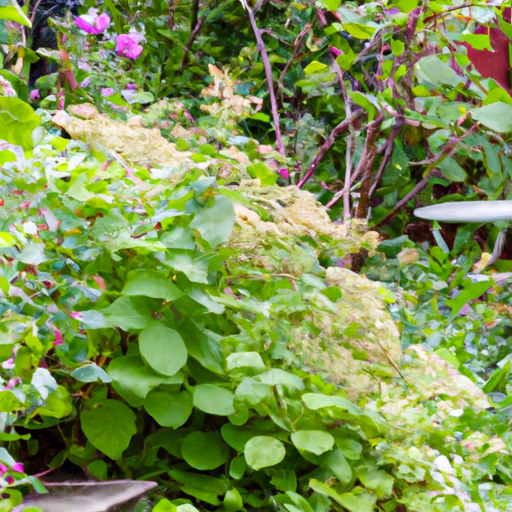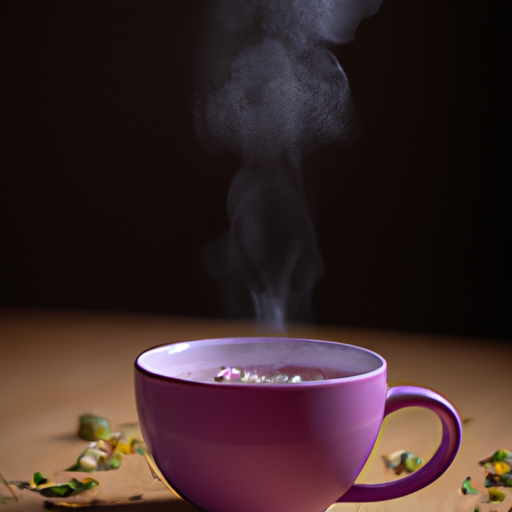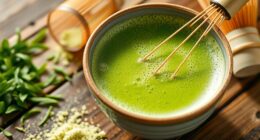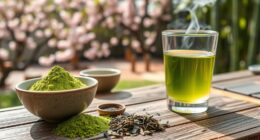Are you excitedly anticipating the arrival of your baby? Just like many soon-to-be moms, you might be exploring natural ways to jumpstart labor. Look no further! This article will explore the use of herbal teas and how they can potentially help induce labor.
Think of herbal teas as gentle whispers from Mother Nature, gently coaxing your body into the miraculous process of childbirth. From the renowned Raspberry Leaf Tea to the soothing benefits of Chamomile Tea, we will explore a variety of herbal options that may help stimulate contractions and bring you closer to meeting your bundle of joy. We’ll also uncover the traditional remedies of Black Cohosh and Blue Cohosh Tea, known for their labor-inducing properties.
However, before embarking on this herbal journey, it is crucial to consider safety considerations and precautions. So, grab your favorite mug, settle in, and let’s dive into the world of herbal teas that may just help you go into labor naturally and safely.
Key Takeaways
- Raspberry Leaf Tea is a natural method that strengthens uterine muscles for more effective contractions during labor, but it is not meant to induce labor prematurely.
- Chamomile Tea can provide relaxation, pain relief, and hormonal balance during labor, preparing the body for labor induction.
- Nettle Tea’s effectiveness in inducing labor is uncertain, but it contains beneficial minerals for pregnancy. Consultation with a healthcare professional is recommended.
- Black Cohosh Tea is a traditional remedy that stimulates contractions by mimicking oxytocin, but its safety and effectiveness have not been widely studied. Consultation with a healthcare professional is recommended.
Raspberry Leaf Tea and Its Potential Effects on Labor
If you’re looking for a herbal tea that might help kickstart your labor, raspberry leaf tea could be just the thing for you! Raspberry leaf tea has long been used by pregnant women to potentially benefit their labor experience.
It’s believed that this tea can strengthen the uterine muscles, which may lead to more effective contractions during labor. However, it’s important to note that raspberry leaf tea is not meant to induce labor prematurely but rather to prepare the body for the birthing process.
The dosage and timing of raspberry leaf tea for maximum effectiveness can vary. It is recommended to start drinking this tea around 32 weeks of pregnancy, gradually increasing the intake up to 3 cups a day.
Always consult with your healthcare provider for personalized advice before trying any herbal remedy during pregnancy.
Chamomile Tea: A Natural Approach to Inducing Labor
Want a natural way to encourage the onset of labor? Try sipping on some chamomile-infused goodness. Chamomile tea has long been known for its soothing and calming properties, but did you know it can also help with labor induction?
Here are some benefits of chamomile tea for pregnant women:
- Relaxation: Chamomile tea can help relax the body and mind, which is essential during labor.
- Pain relief: The anti-inflammatory properties of chamomile can help alleviate labor pains.
- Hormonal balance: Chamomile tea can help regulate hormones, which can aid in the progression of labor.
To prepare chamomile tea for labor induction, simply steep a chamomile tea bag in hot water for about 5 minutes. You can add honey or lemon for taste, but avoid adding any other herbs or supplements without consulting your healthcare provider.
Remember, always consult with your healthcare provider before attempting any natural methods to induce labor.
The Role of Red Raspberry Leaf Tea in Promoting Contractions
Sipping on red raspberry leaf tea can play a significant role in promoting contractions during labor. Red raspberry leaf tea has been used for centuries as a natural remedy to support the female reproductive system. It’s believed to tone the uterus and strengthen the uterine muscles, leading to more effective contractions during labor.
The potential benefits of drinking red raspberry leaf tea include shorter labor duration, reduced risk of postpartum hemorrhage, and improved recovery after childbirth. However, it’s important to note that the effects may vary from person to person, and more research is needed to fully understand the benefits.
While generally considered safe, some individuals may experience mild side effects such as nausea or loose stools. It’s always advisable to consult with a healthcare professional before incorporating red raspberry leaf tea into your labor preparation routine.
Nettle Tea: Can It Help Kickstart Labor?
Nettle tea has gained popularity as a potential aid in initiating labor, but it’s effectiveness is still uncertain. While some women swear by its ability to kickstart labor, there’s limited scientific evidence to support this claim.
Nettle tea is known for its rich mineral content, including iron, calcium, and magnesium, which can be beneficial during pregnancy. These minerals are essential for the development of the baby and can help prevent common pregnancy complications such as anemia and preeclampsia.
However, it’s important to note that nettle tea alone may not be enough to induce labor. It’s always recommended to consult with a healthcare professional before trying any herbal remedies, including nettle tea, to ensure the safety and well-being of both the mother and the baby.
Black Cohosh Tea: A Traditional Remedy for Inducing Labor
Black Cohosh tea has traditionally been used to help induce labor, but it’s important to discuss its effectiveness and safety with a healthcare professional. Black Cohosh is a medicinal herb that has been used for centuries to stimulate contractions and promote labor. It’s believed to work by mimicking the effects of the hormone oxytocin, which initiates labor. However, the safety and effectiveness of Black Cohosh tea for inducing labor have not been widely studied.
It’s always recommended to consult with a healthcare professional before using any herbal remedy during pregnancy. It’s crucial to follow the recommended dosage instructions provided by a qualified herbalist or healthcare provider.
It’s worth mentioning that raspberry leaf tea is another herbal remedy often recommended during pregnancy for its potential benefits in preparing the uterus for labor.
Blue Cohosh Tea: Exploring Its Labor-Inducing Properties
If you’re looking to explore natural ways to induce labor, have you ever considered giving Blue Cohosh a try? Blue Cohosh tea is a herbal remedy that’s been used for centuries to help stimulate contractions and promote labor.
While there’s limited scientific evidence to support its effectiveness, many women have reported positive results after consuming Blue Cohosh tea. However, it’s important to note that there are risks associated with using this herbal remedy.
Blue Cohosh can cause uterine contractions that are too strong, leading to potential complications. It’s crucial to consult with a healthcare professional before using Blue Cohosh tea or any other herbal remedy to induce labor. They can provide you with personalized advice and guidance, taking into consideration your specific medical history and circumstances.
Remember, always prioritize your safety and seek medical advice before trying any natural remedies to induce labor.
Safety Considerations and Precautions for Using Herbal Tea to Induce Labor
Before diving into using natural remedies to induce labor, it’s vital to understand the safety considerations and precautions involved when trying herbal options. While herbal tea can be a popular choice for women looking to naturally induce labor, it is important to approach it with caution and under the guidance of a healthcare professional. Herbal teas, including those believed to have labor-inducing properties, may have potential risks and side effects. Some herbs used in labor-inducing teas, such as blue cohosh, may have uterine-stimulating effects that can potentially increase the risk of complications or harm to the mother and baby. It is crucial to consult with a healthcare provider before using any herbal tea to induce labor to ensure the safety of both mother and baby.
Frequently Asked Questions
Is it safe to consume herbal tea to induce labor?
Consuming herbal tea to induce labor can pose potential risks, such as uterine hyperstimulation. Safe alternatives include nipple stimulation and acupuncture. It’s crucial to consult a healthcare professional before attempting any labor-inducing methods.
How soon can I expect to go into labor after drinking herbal tea?
After drinking herbal tea, the time it takes to go into labor can vary. It’s important to note that the long-term effects of consuming herbal tea to induce labor are not well-studied. Comparing its effectiveness to other natural methods is also necessary.
Are there any side effects or risks associated with drinking herbal tea to induce labor?
There are potential risks and safety concerns associated with drinking herbal tea to induce labor. It’s important to consult with a healthcare professional before trying any methods to induce labor, including herbal teas, to ensure the safety of both mother and baby.
Can I combine different types of herbal teas to enhance their labor-inducing effects?
Combining herbal teas for labor induction can be beneficial, but it’s important to consult with a healthcare professional first. Alternatives like raspberry leaf tea and evening primrose oil may help stimulate contractions.
Are there any specific dosage recommendations for consuming herbal tea to induce labor?
Dosage recommendations for herbal tea to induce labor vary, but it’s generally recommended to start with a small amount and gradually increase. Safety concerns include potential side effects and interactions with medications, so it’s important to consult with a healthcare provider.
Conclusion
Well, folks, it seems that when it comes to herbal tea and inducing labor, there’s a whole world of possibilities out there. From raspberry leaf tea to chamomile tea, nettle tea to black cohosh tea, the options are endless. But before you go brewing up a storm in hopes of jumpstarting labor, it’s important to remember that herbal remedies should always be approached with caution. While these teas have been used traditionally for centuries, it’s always best to consult with your healthcare provider before trying anything new. Safety first, folks!










